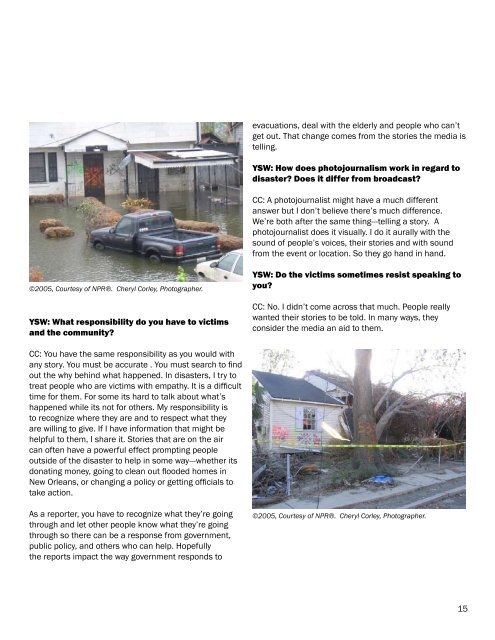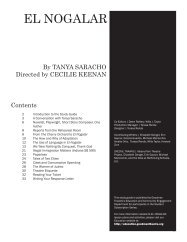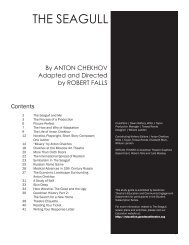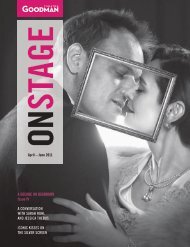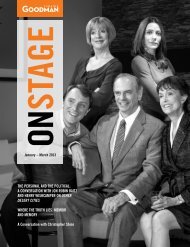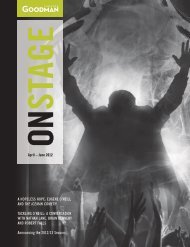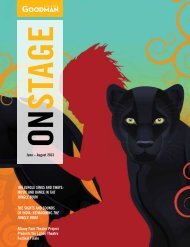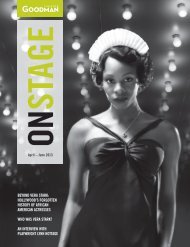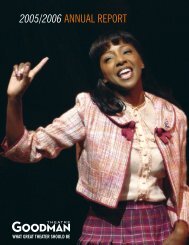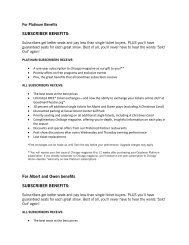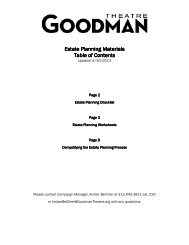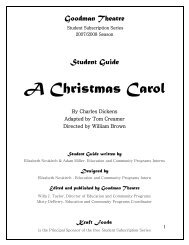A True History of the Johnstown Flood Study - Goodman Theatre
A True History of the Johnstown Flood Study - Goodman Theatre
A True History of the Johnstown Flood Study - Goodman Theatre
Create successful ePaper yourself
Turn your PDF publications into a flip-book with our unique Google optimized e-Paper software.
evacuations, deal with <strong>the</strong> elderly and people who can’t<br />
get out. That change comes from <strong>the</strong> stories <strong>the</strong> media is<br />
telling.<br />
YSW: How does photojournalism work in regard to<br />
disaster? Does it differ from broadcast?<br />
CC: A photojournalist might have a much different<br />
answer but I don’t believe <strong>the</strong>re’s much difference.<br />
We’re both after <strong>the</strong> same thing---telling a story. A<br />
photojournalist does it visually. I do it aurally with <strong>the</strong><br />
sound <strong>of</strong> people’s voices, <strong>the</strong>ir stories and with sound<br />
from <strong>the</strong> event or location. So <strong>the</strong>y go hand in hand.<br />
©2005, Courtesy <strong>of</strong> NPR®. Cheryl Corley, Photographer.<br />
YSW: What responsibility do you have to victims<br />
and <strong>the</strong> community?<br />
YSW: Do <strong>the</strong> victims sometimes resist speaking to<br />
you?<br />
CC: No. I didn’t come across that much. People really<br />
wanted <strong>the</strong>ir stories to be told. In many ways, <strong>the</strong>y<br />
consider <strong>the</strong> media an aid to <strong>the</strong>m.<br />
CC: You have <strong>the</strong> same responsibility as you would with<br />
any story. You must be accurate . You must search to find<br />
out <strong>the</strong> why behind what happened. In disasters, I try to<br />
treat people who are victims with empathy. It is a difficult<br />
time for <strong>the</strong>m. For some its hard to talk about what’s<br />
happened while its not for o<strong>the</strong>rs. My responsibility is<br />
to recognize where <strong>the</strong>y are and to respect what <strong>the</strong>y<br />
are willing to give. If I have information that might be<br />
helpful to <strong>the</strong>m, I share it. Stories that are on <strong>the</strong> air<br />
can <strong>of</strong>ten have a powerful effect prompting people<br />
outside <strong>of</strong> <strong>the</strong> disaster to help in some way---whe<strong>the</strong>r its<br />
donating money, going to clean out flooded homes in<br />
New Orleans, or changing a policy or getting <strong>of</strong>ficials to<br />
take action.<br />
As a reporter, you have to recognize what <strong>the</strong>y’re going<br />
through and let o<strong>the</strong>r people know what <strong>the</strong>y’re going<br />
through so <strong>the</strong>re can be a response from government,<br />
public policy, and o<strong>the</strong>rs who can help. Hopefully<br />
<strong>the</strong> reports impact <strong>the</strong> way government responds to<br />
©2005, Courtesy <strong>of</strong> NPR®. Cheryl Corley, Photographer.<br />
15


